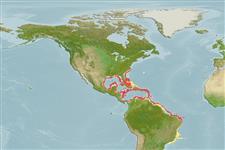Teleostei (teleosts) >
Eupercaria/misc (Various families in series Eupercaria) >
Lutjanidae (Snappers) > Etelinae
Etymology: Etelis: Greek, etelis, -idos = a fish, perhaps the fish Sparus aurata (Ref. 45335).
More on author: Valenciennes.
Environment: milieu / climate zone / depth range / distribution range
Ecology
Marine; bathydemersal; depth range 100 - 450 m (Ref. 9626). Deep-water; 37°N - 25°S, 8°E - 32°W
Western Atlantic: Bermuda and North Carolina, USA, Gulf of Mexico southward through the Caribbean to Sau Paulo, Brazil (Ref. 55), including the Fernando do Noronha and Atol das Rocas Islands (Ref. 113956).
Length at first maturity / Size / Weight / Age
Maturity: Lm 31.0, range 35 - ? cm
Max length : 100.0 cm TL male/unsexed; (Ref. 9626); common length : 64.0 cm TL male/unsexed; (Ref. 6912); max. published weight: 6.3 kg (Ref. 56081)
Dorsal spines (total): 10; Dorsal soft rays (total): 11; Anal spines: 3; Anal soft rays: 8. Head small; eye large; snout short. Maxilla covered with small scales; lower jaw slightly projecting. Dorsal and anal fin bases without scales; caudal fin deeply forked. Scale rows on the back running parallel with the lateral line. Back and upper sides deep pink to red; lower sides and belly pink; fins pink except the spinous portion of the dorsal fin; entire caudal fin brilliant red.
Adults inhabit rocky bottoms and feeds mainly on small fishes and squids. They are abundant near oceanic islands (Ref. 9626). Small individuals are taken as by-catch in trawl fisheries (Ref. 5217). Marketed mostly fresh, sometimes frozen. Flesh of good quality.
Life cycle and mating behavior
Maturity | Reproduction | Spawning | Eggs | Fecundity | Larvae
Allen, G.R., 1985. FAO Species Catalogue. Vol. 6. Snappers of the world. An annotated and illustrated catalogue of lutjanid species known to date. FAO Fish. Synop. 125(6):208 p. Rome: FAO. (Ref. 55)
IUCN Red List Status (Ref. 130435: Version 2024-1)
Threat to humans
Harmless
Human uses
Fisheries: commercial; gamefish: yes
Tools
Special reports
Download XML
Internet sources
Estimates based on models
Preferred temperature (Ref.
123201): 13.3 - 22.7, mean 18.3 °C (based on 73 cells).
Phylogenetic diversity index (Ref.
82804): PD
50 = 0.5625 [Uniqueness, from 0.5 = low to 2.0 = high].
Bayesian length-weight: a=0.01698 (0.01382 - 0.02086), b=2.93 (2.87 - 2.99), in cm total length, based on LWR estimates for this species (Ref.
93245).
Trophic level (Ref.
69278): 4.2 ±0.57 se; based on food items.
Generation time: 3.8 ( na - na) years. Estimated as median ln(3)/K based on 2
growth studies.
Resilience (Ref.
120179): Medium, minimum population doubling time 1.4 - 4.4 years (K=0.29-0.61).
Prior r = 0.24, 95% CL = 0.16 - 0.36, Based on 1 data-limited stock assessment.
Fishing Vulnerability (Ref.
59153): Low to moderate vulnerability (34 of 100).
Nutrients (Ref.
124155): Calcium = 20.6 [8.4, 56.2] mg/100g; Iron = 0.501 [0.218, 1.134] mg/100g; Protein = 18.2 [16.1, 20.1] %; Omega3 = 0.387 [0.185, 0.742] g/100g; Selenium = 21.5 [8.7, 53.3] μg/100g; VitaminA = 7.31 [1.36, 42.54] μg/100g; Zinc = 0.252 [0.166, 0.397] mg/100g (wet weight);
